Humane Society International
Region: Italy
Humane Society International / Europe
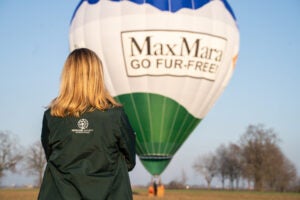
MILAN—After receiving hundreds of thousands of emails from compassionate consumers around the world, thousands of phone calls, countless social media posts and even having a hot air balloon flown over its headquarters in Italy asking it to go fur-free, Max Mara Fashion Group has officially announced a fur-free policy.
In an internal memo to staff, Max Mara said, “The Company does not sell, online nor in any of its physical retail locations, any products made with fur, nor is there the intention to introduce any products made with fur into any upcoming collections of Max Mara Fashion Group brands.”
This was confirmed by a Max Mara executive, who added, “Max Mara, including the MMFG and any subsidiaries, has adopted a fur-free policy and has no intention of introducing fur into any upcoming collection for any of the MMFG brands.”
This announcement comes after the Fur Free Alliance, a coalition of more than 50 animal protection organizations―including Humane Society International― from over 35 countries, launched a global campaign during fashion weeks in February 2024 in New York City, London, Milan and Paris urging the Italian fashion giant to adopt a fur-free policy. The campaign saw more than 270,000 emails, 5,000 phone calls and countless social media posts delivering a clear message asking Max Mara to go fur-free.
Max Mara Fashion Group has 2,500+ stores in 105 countries and was previously selling items such as mink gloves, fox fur cuffs and a raccoon dog key chain. The brand now joins the world’s major fashion-houses that have already gone fur-free, including Dolce & Gabbana, Saint Laurent, Valentino, Prada, Gucci, Versace, Alexander McQueen, Balenciaga and Armani.
In February this year, Humane Society International/Europe and LAV flew a hot-air balloon over Max Mara’s headquarters in the city of Reggio Emilia during Milan Fashion Week, displaying a fur-free message.
P.J Smith, director of fashion policy at Humane Society International and the Humane Society of the United States, said: “Congratulations to Max Mara for joining so many other fashion brands and retailers that have already taken a stand against the cruel fur trade. Activists around the world came together to ask Max Mara to do the right thing, and they listened, making it clear fur has no place in fashion. Let’s celebrate this win for animals and a fur-free future!”
Joh Vinding, chairman of the Fur Free Alliance, said: “The Fur Free Alliance applauds Max Mara for going fur-free. Max Mara was one of the last global fashion brands that still sold fur, so we’re glad they have now joined a growing list of fur-free brands that want nothing to do with animal cruelty associated with the fur trade.”
Today, over 1,500 brands and retailers have pledged to go fur-free by joining the Fur Free Retailer Program.
Fur facts:
- Tens of millions of animals suffer and die each year in the global fur trade. The majority of the animals killed for fur are reared in barren battery cages on fur farms.
- Fur farming has been banned in 21 European countries – the 15 Member States of Austria, Belgium, Croatia, Czech Republic, Estonia, France, Ireland, Italy, Latvia, Lithuania, Luxembourg, Malta, Netherlands, Slovakia, Slovenia plus Bosnia and Herzegovina, Guernsey, Norway, United Kingdom, North Macedonia and Serbia. In addition, two countries (Switzerland and Germany) have implemented strict regulations which have effectively brought fur farming to an end and three countries (Denmark, Sweden, Hungary) have imposed measures that have ended the farming of certain species. Mink farming has also been banned in the Canadian province of British Colombia. Political discussion of a ban is underway in Bulgaria, Romania and Sweden.
- Israel became the first country to ban fur sales, in 2021. In the United States, fur sales are banned in the state of California as well as ins 16 towns or cities. Political discussion on a fur import ban is underway in Switzerland
- Mink on almost 488 fur farms across 13 countries in Europe and North America have been found to be infected with COVID-19. Millions of farmed mink, in countries such as Denmark and the Netherlands, were ordered to be killed on public health grounds. Highly Pathogenic Avian Influenza A(H5N1) has been found on 72 fur farms (one in Spain, 71 in Finland) to date. Around 500,000 animals, including mink, arctic fox, red fox, raccoon dogs and sable, have been ordered to be killed on public health grounds.
Download visuals of the Max Mara hot-air balloon stunt.
Media contact: Yavor Gechev, EU communications director: ygechev@hsi.org
Humane Society International / Italy
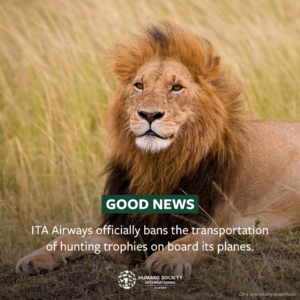
ROME—The leading Italian airline, ITA Airways, proudly announces its support of the campaign #NotInMyWorld of the global animal protection charity Humane Society International/Europe. The airline has adopted a new corporate policy that prohibits the transportation of hunting trophies on all company flights, both as cargo and as passenger baggage. This stands as a significant testament to the Company’s commitment to wildlife conservation, as well as a substantial contribution to ending trophy hunting and fostering business practices that acknowledge the global community’s responsibility for biodiversity protection.
Hundreds of thousands of animals globally, including endangered and threatened species, are killed by trophy hunters for amusement and boasting, contributing to the decline of wild populations, conservation challenges, and inhumane practices. Unlike subsistence hunting, the primary motivation for those engaged in this activity is to kill animals for competition and entertainment, targeting rare or highly sought-after animals for their physical characteristics (thick manes, long tusks, overall size, etc.) and turning them into trophies for display to showcase success in hunting. Considering that a significant number of trophy hunters who book overseas hunting trips intend to transport their macabre souvenirs back home, the transportation sector plays a key role in facilitating this ethically questionable and harmful industry.
On a national level, ITA Airways’ commitment holds particular significance since Italy ranks among the primary importers of hunting trophies in Europe. Between 2014 and 2021, 442 hunting trophies from mammals protected under CITES (Convention on International Trade in Endangered Species) were imported, including hippos, rhinos, elephants, and lions. These data reveal the country’s active involvement in the trophy hunting industry, despite a survey indicating that 86% of Italians oppose this practice, with 74% supporting a legislative ban on trophy imports.
By joining the campaign, ITA Airways has taken several measures including:
- Addition of hunting trophies to the list of prohibited items: ITA Airways has expanded the list of prohibited items for transportation in both passenger baggage and cargo, expressly including hunting trophies. This clear prohibition ensures that such items are not accepted on ITA Airways flights.
- Online publication of the policy: The hunting trophy policy has been published on the ITA Airways’ official website, providing transparency and accessibility to the new directives. This step reflects the Company’s commitment to open and responsible communication.
- Update of operational manuals for cargo and ground procedures: ITA Airways has reviewed and updated its operations manuals, ensuring that the new provisions regarding hunting trophies are fully integrated into cargo procedures and ground operations.
- Dissemination of the policy to staff, hubs, and suppliers: The new policy has been disseminated at all levels of the Company, including flight and ground staff, as well as suppliers and hubs where the airline operates. This dissemination ensures full understanding and adherence to the new provisions regarding hunting trophies.
Giovanna Di Vito, ITA Airways’ chief program office, ESG & Customer Operations, emphasizes “Our firm support for Humane Society International/Europe’s campaign to stop the import of hunting trophies into Italy and Europe reflects ITA Airways’ ongoing commitment to the planet, our country, and communities. Our Company’s new policy, which formalizes a ban on the carriage of hunting trophies on its flights, is a concrete action, our contribution to the protection of wildlife and the promotion of that protection. Indeed, we believe that companies have a key role in supporting and spreading ethical practices that represent real progress toward a more responsible and sustainable future.”
Martina Pluda, director of Humane Society International/Europe in Italy, states: “ITA Airways’ support to our campaign and their new policy represent a highly significant contribution to the goal of ending cruel trophy hunting. In fact, the corporate sector also plays a huge role in the collective action necessary to protect threatened wildlife globally. With HSI/Europe’s #NotInMyWorld campaign, we continue to strengthen our commitment to the preservation of endangered animal species and flora and for the introduction of bans on import, export and re-export of hunting trophies from protected animals in Italy and Europe.”
In addition to ITA Airways, an increasing number of airlines, cargo operators, and transport companies worldwide have adopted corporate policies against the transportation of hunting trophies. Please visit hsi.org/trophy-free-transport for an overview of all transport companies.
Visit the new ITA Airways corporate policy
END
Media contact:
- HSI/Europe: Eva-Maria Heinen, communications & PR manager for HSI in Italy and Germany: emheinen@hsi.org; 3338608589
- ITA Airways: Pietro Caldaroni, Head of Communication and Institutional relations; media@ita-airways.com
Humane Society International responds to Kodami investigation as further evidence of trophy hunters’ political greenwashing and the division amongst hunters.
Humane Society International / Europe
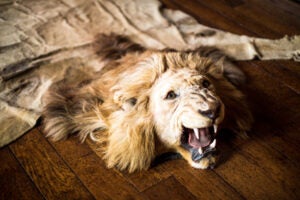
ROME—Yesterday, the Italian media outlet Kodami released a video of their independent undercover investigation undertaken at “Jagd & Hund”, Europe’s largest hunting fair held in Dortmund, Germany from January 24-29, delivering another shocking look behind the scenes of an industry currently under intense political scrutiny in Europe as multiple Member States consider hunting trophy trade bans.
Humane Society International and affiliates have been at the forefront of a global fight to ban the trade in hunting trophies of imperiled species. For years, the Humane Society of the United States has unveiled what happens at the world’s largest annual hunting fair hosted by Safari Club International in the United States, working to unmask the hypocrisy of the trophy hunting lobby and its attempts to greenwash the exploitative industry while lobbying against endangered species protections.
Kodami’s investigation findings add to a growing collection of evidence of trophy hunters’ political equivocation and blatant disregard for conservation principles. Many hunters are condemning trophy hunting as unacceptable in modern society. Multiple investigations by HSI and the HSUS over the years revealed:
- The presentation of trophy hunting as a well-managed, conservation-focused industry is a farce. When gathered together at these conventions, outfitters and trophy hunters have undermined or outright dismissed ethical and animal welfare considerations. At the Staffordshire County hunting fair in 2022 an HSI investigator asked if he could drink alcohol while on a hunt in Africa. The outfitters’ response was: “Yeah, they [expletive] don’t give a [expletive] over there. [Expletive] me if you want to go around with a beer and a cigar and [expletive] blast stuff. They’re pretty laid back.” This crude, irresponsible sentiment was seen across multiple investigations, outfitters and guests.
- Trophy hunting outfitters at the fairs use gimmicks and deep discounts on animals’ lives to increase sales. Many offer canned hunts—where the animal is bred and shot in captivity—or “easy” hunts where they can guarantee a kill for a client.
Outfitters push marketing schemes meant to maximize hunt sales regardless of the hunters’ proficiency by promising a family-like experience with the guides and glorifying the adrenaline of trophy hunting, preparing inexperienced clients in as little as a day. They also claim to “bend the rules” around hunts and ethics, offering clients the option of hunting from the back of trucks or setting up captive hunts.
- Children are often present and featured in promotional material to encourage family engagement. It was apparent to HSUS investigators that killing animals for pleasure and keeping their body parts was being normalized for children at these conventions. One conference attendee attendee told investigators that he and his children participated in a canned hunt, killing “their” lion within 90 minutes.
- Investigators found that the hunting community is not united in support of trophy hunting. Many hunters believe that captive hunting, baiting and hunting from a vehicle violate fair chase ethics, while others don’t support hunting of iconic or imperiled animals or hunting animals when meat consumption isn’t a primary driver.
Kodami’s investigation video further proves what Humane Society International has been pointing out for years: the trophy hunting industry’s economic model incentivizes over-exploitation which can push imperiled species like lions, leopards and elephants further towards extinction. The sales model found across all conventions indicates that the value of wildlife is determined by consumer demand, not by their intrinsic value, conservation status or value to local communities. Trophy fees can run up to US$65,000 for wild lions and US$35,000 for leopards and are typically around US$40,000 for an elephant, depending on the size of their tusks. The record auction for a hunt of a black rhino—one of the most endangered mammals on the planet—was at the 2014 Safari Club International convention for US$400,000. However, the industry also chooses which animals to devalue either by setting trophy fees low such as for ducks, doves and guinea fowl “worth” only US$5; by offering extreme discounts for the hunting packages (a giraffe hunt was offered for US$1,200 as “a giveaway”); or by offering animal kills for free as bait, such as hippos (whose numbers are declining), to draw out the target trophy animal such as lions and leopards.
Humane Society International/Europe executive director Ruud Tombrock, after seeing the footage released by Kodami yesterday, commented: “Trophy hunters can’t seem to hide their passion for carnage or complete disrespect for animals for long when they all gather together at conventions like the Jagd & Hund in Germany, Cinegética in Spain, and Safari Club International’s in the U.S. Undercover investigations like Kodami’s and ours are vitally important to dispel the ‘helping hand’ fantasy that the hunting lobby has peddled to policymakers and the public. These false representations of the industry have so far secured for them hunting and trade policy exemptions for imperiled wildlife they shot for fun where it would otherwise be prohibited. We cannot let this pandering continue under their lobby’s false narrative. Policymakers need to see their true nature and put an end to facilitating their abuse of wildlife.”
Background:
- The EU is the second largest importer of hunting trophies with 14.912 hunting trophies from 73 different CITES-listed mammalian species imported between 2014-2018, such as leopards, hippos, elephants, lions and even species like the critically endangered black rhino. Hunting fairs played a significant role in the promotion and sale of the represented hunts.
- More and more transport companies pledged to prohibit transporting of hunting trophies. Find here a list of more than 30 airlines, freight carriers and businesses from the transport sector that have a passenger baggage or cargo policy against hunting trophies.
- HSI/Europe has been advocating for a ban on hunting trophy imports with its campaign #NotInMyWorld aimed at the European Union and Member States since 2021. Our petition to the European Parliament calls for urgent action to ensure that the existing requirements of the EU Wildlife Trade Regulations and Habitats Directive with respect to hunting trophies are being properly implemented, as outlined in commitments in the EU Biodiversity Strategy.
- We’ve made significant progress to date:
- On June 21st the French Assembly adopted an amendment that will significantly assist customs authorities in limiting the import of hunting trophies of certain endangered animal species into France by an overwhelming majority (113 votes for, one vote against). This vote coincides with a new legislative proposal for a ban brought forth by Senator Céline Boulay-Espéronnier on May 23.
- In March 2023, British lawmakers in the House of Commons advanced legislation that would ban the import of animal hunting trophies from over 6,000 internationally regulated species, including elephants, rhinos and leopards. The bill is currently under consideration by the House of Lords.
- Last year in Italy, IEG Italian Exhibition Group SpA announced it will no longer host the HIT Show (Italy’s largest hunting fair with 40,000 visitors and hundreds of international exhibitors each year) citing explicitly the event’s incompatibility with environmental values and mission of the event.
- Finland banned the import from outside the EU of hunting trophies of species protected under Annex A and 12 species under Annex B of the EU Wildlife Trade Regulations in 2022.
- The Belgian federal parliament unanimously called on the government in 2022 to immediately stop issuing import permits for trophies of species protected by specific international trade regulations.
- The European Parliament adopted a resolution in 2022 calling for an end to the import of hunting trophies into the EU of protected species.
- In 2016, the Netherlands banned imports of trophies of more than 200 species, and in 2015, France banned imports of lion trophies.
ENDS
Media contact: Eva-Maria Heinen, communications and PR manager for Germany&Italy: emheinen@hsi.org
HSI/Europe welcomes Italian Exhibition Group’s decision todiscontinue HIT Show for its incompatibility with environmental values
Humane Society International / Europe
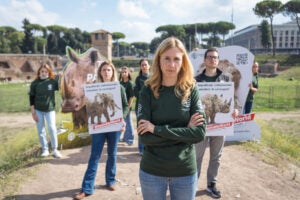
VICENZA, Italy —Martina Pluda, director for Italy at Humane Society International/Europe, states the following regarding the announcement by IEG Italian Exhibition Group SpA to discontinue HIT Show, the hunting fair:
“I welcome the decision by IEG Italian Exhibition Group SpA to no longer organize HIT Show, Italy’s largest hunting fair that had 40,000 visitors and hundreds of international exhibitors per year. According to research by Humane Society International/Europe, many outfitters offered trophy hunting trips targeting protected species. In their statement, the company that runs the Vicenza exhibit hall stressed the incompatibility of this event with environmental values and its own mission. Public opinion is consistent with that view. In fact, according to an HSI/Europe poll, 86% of Italians surveyed oppose trophy hunting of all wild animals.
Trophy hunters from the European Union kill thousands of wild animals worldwide, including endangered or threatened species, with Italy being a major trophy destination. In addition to the cruelty and loss of animals who could contribute to a diverse gene pool while the world is facing a biodiversity crisis, it is irresponsible to allow wealthy elites to shoot endangered species for pure pleasure and to promote this practice as a recreational activity. Hunting shows are an important yet disgraceful showcase for outfitters who offer the opportunity to hunt lions, elephants, hippos and many other species for several thousand euros on macabre price lists. The divestment by IEG of the HIT Show is a strong blow to the industry and a clear signal.
Shooting, stuffing, packing and receiving dead animals and their body parts and displaying them in their homes motivates these hunters. An import ban on trophies in more EU countries would effectively help stop the killing of these animals. Already since the last legislature, HSI/Europe’s #NotInMyWorld campaign has been calling for Italy to introduce a ban on the import, export and re-export of hunting trophies obtained from internationally protected species. With the submission of a bill on this issue we have taken the first step. I trust that the next government will want to work to achieve this goal together with us and the Italian people, once and for all.”
Facts:
- Between 2014 and 2020, Italy imported 437 hunting trophies from internationally protected species such as hippos, elephants, lions, leopards, cheetahs, brown bears and polar bears.
- Notably, Italy was one of five countries to have imported at least one critically endangered black rhino trophy.
- According to a survey commissioned by HSI/Europe to Savanta ComRes, 86% of Italians surveyed oppose trophy hunting of all wild animals, 88% agree that Italians should not be allowed to import hunting trophies from other countries, and 74% support a total ban on the export and import of dead animal trophies to and from Italy.
- A petition launched by HSI/Europe in Italy has already collected more than 45,000 signatures.
ENDS
Media contact: Martina Pluda, HSI in Italy’s country director: mpluda@hsi.org; 3714120885
Hon. Ferraresi and Flati in partnership with Humane Society International: ’A crucial step to stop Italy’s involvement in this anachronistic and cruel practice that endangers the survival of many wild species.’
Humane Society International / Europe
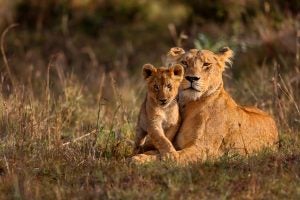
ROME—Today, in honoring World Wildlife Day, the Honorables Vittorio Ferraresi and Francesca Flati (M5S) presented a bill at the Chamber of Deputies to ban the import and export of hunting trophies of endangered species, the first of its kind in Italy. The bill was presented in partnership with Humane Society International with Martina Pluda, director of HSI in Italy, at the chamber for the occasion.
After close collaboration with key stakeholders, including HSI, Bill nr. 3430 would amend Law no. 150/1992, which regulates the trade of threatened and endangered species in Italy and will position Italy as a strong champion in the fight to protect global biodiversity and to institute sustainable, effective conservation initiatives for imperiled wildlife. This initiative follows the recent publication of HSI/Europe’s report: “Trophy Hunting by the Numbers: The European Union’s role in global trophy hunting” which highlights the European Union’s devastating contribution to the trophy hunting industry as the world’s second largest importer of hunting trophies after the United States. The items being imported include trophies from threatened and endangered species.
The bill provides for:
- the ban on the import, export and re-export to and from Italy of hunting trophies of species protected under Annexes I and II of the Convention on International Trade in Endangered Species of Wild Fauna and Flora (CITES).
- a penalty, in case of violation of the prohibition, of up to three years in prison, a fine of up to 200,000 euros for primary violations, a fine of up to 300,000 euros in cases of recidivism, and confiscation of the hunting trophie(s).
From 2014 to 2018, the EU imported nearly 15,000 hunting trophies of 73 internationally protected species–with Italy importing 322 of the total trophies. Similar numbers were also confirmed from 2019-2020, despite the COVID-19 pandemic; during this period, Italy imported 105 hunting trophies of 13 different mammal species protected under CITES, including threatened lions, endangered African elephants, and critically endangered black rhinos. From 2014-2018, Italy was the largest EU importer of 145 hippopotamus trophies, the fourth of wild African lion trophies and the fifth of African elephant trophies. Over 80% of the lion trophies imported to Italy over the period were bred in captivity or derived from “canned hunting” practices, a type of trophy hunting which involves shooting bred animals in enclosed spaces to guarantee a kill.
The importation of hunting trophies to Italy is currently legal despite the majority of Italians opposing hunting wild animals for the purpose of a trophy. In fact, according to the results of a recent survey by Savanta ComRes and commissioned by HSI/Europe, 86% of the Italians interviewed oppose the trophy hunting of all wild animals, and 74% are in favor of a ban on the import of hunting trophies to Italy.
The Honorable Vittorio Ferraresi, first signatory of the bill, said: “This bill aims to combat the killing of protected and endangered species that we may never see again, and the violence that is perpetrated against them. The protection of biodiversity is also an important factor in human survival and when it is undermined, the future and quality of life of future generations is at risk.”
The Honorable Francesca Flati stated: “Animals are not trophies to be exhibited, but living, sentient beings. With this bill we want to put an end to unregulated hunting. Let’s immediately stop the import and export of hunting trophies! With the 5 Star Movement we are in the front line and working to stop this despicable practice.”
Martina Pluda, director for Italy, Humane Society International, says: “With this bill we are giving Italy the opportunity to take the side of wildlife and their real protection. We urge Parliament to stop the practice of hunting protected animals for fun and importing them to Italy as macabre trophies, to be hung over a fireplace for boasting. It is a step that meets the favor of Italians who have demonstrated clear opposition to this elitist and anachronistic practice that has nothing to do with the conservation of species and biodiversity.”
Senator Gianluca Perilli, who in December 2021 promoted, together with other senators, an amendment to the Budget Law on the issue, expressed his support with the following statement: “Our commitment to protect animals and biodiversity goes beyond our national borders. With the approval of the constitutional reform, which introduces the protection of the environment, biodiversity and animals into the Constitution, we have taken a very important step for our society, but we are aware that other regulatory measures will have to follow. Banning the import and export of hunting trophies at international level means safeguarding those wild species threatened with extinction and protecting biodiversity.”
From Cape Town, Audrey Delsink, wildlife director for HSI/Africa, points out: “Trophy hunting has been shown to have a detrimental impact on the conservation of wildlife. There are many ways that trophy hunting can negatively affect population dynamics such as low reproductive output, reduced offspring survival, lower adult survival and increased mortality rates in species such as lions, leopards and cougars to name but a few. In addition to this threat, trophy hunting does not support local communities, which continue to live in conditions of extreme poverty. Indeed, a study of eight African countries shows that while overall tourism is between 2.8% and 5.1% of the gross domestic product, the total economic contribution of trophy hunters is at most about 0.03% of GDP.”
“This bill represents a concrete political action to stop our country’s shameful involvement in an anachronistic and cruel practice that contributes to endangering the global survival of many wild species”, conclude Ferraresi, Flati and Pluda.
Download Photos from the Presentation
ENDS
Media contacts:
- Eva-Maria Heinen, communications and PR manager for Italy: emheinen.hsi@gmail.com
- Martina Pluda, Italy country director: mpluda@hsi.org; 371.4120885
Humane Society International / Italy
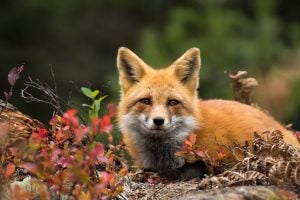
ROME—Iconic Italian fashion designer Valentino is the latest major fashion house to drop fur from its collections and shutting down its fur subsidiary, Valentino Polar. The company’s fur-free policy is part of its efforts to redefine and reinvigorate the brand, which will phase out fur by the end of the year.
Reported in Italian media agency ANSA, Valentino said: “The fur-free stance is perfectly in-line with the values of our company. We are moving full-steam ahead in the research for alternative materials in view of a greater attention to the environment for the upcoming collections.”
This announcement comes as the UK government is considering making Britain the first country in the world to ban the sale of fur. The push for a ban comes now that the UK has left the single market, and just two months after British design house Alexander McQueen and Spanish designer Balenciaga declared a fur-free policy. Valentino joins a rapidly expanding group of fashion designers dropping fur, including Prada, Gucci, Armani, Versace, Michael Kors, Jimmy Choo, DKNY, Burberry and Chanel.
Humane Society International, which together with the Humane Society of the United States met with Valentino in 2019 to discuss its fur policy, welcomes the announcement:
Martina Pluda, director of Humane Society International/Italy, said: “Valentino dropping fur is a major nail in the coffin for the cruel fur trade. Like so many other designers, Valentino knows that using fur makes brands look outdated and out of touch, and fur industry certification schemes are little more that the hollow PR spin of an industry that kills 100 million animals for fur a year. Compassion and sustainability are the new luxury in a world where dressing in the fur of factory farmed foxes or gassed mink is tasteless and cruel. As the UK government considers a ban on fur imports and sales, and countries such as Italy are urged to ban fur farming, the world’s top designers are leading the charge with fur-free fashion.”
FUR FACTS:
- Fur farming has been banned across the UK since 2003.
- In 2019, California became the first US state to ban fur sales following similar bans in cities including Los Angeles, San Francisco, Berkeley and West Hollywood.
- A 2020 YouGov opinion poll, commissioned by animal charity Humane Society International/UK, revealed that 93% of the British population reject wearing real animal fur, and the majority (72%) support a ban on the sale of fur in the UK. The poll also demonstrates Brits’ scathing view of fur – the words that people most closely associate with a fashion brand selling fur are ‘unethical,’ ‘outdated,’ ‘cruel’ and ‘out of touch.’
ENDS
Media Contact: Wendy Higgins, director of international media: whiggins@hsi.org
Notes
2020 YouGov poll: All figures, unless otherwise stated, are from YouGov Plc. Total sample size was 1,682 adults. Fieldwork was undertaken between 4th – 5th March 2020. The survey was carried out online. The figures have been weighted and are representative of all GB adults (aged 18+).
Humane Society International urges Italy to permanently ban fur farming to protect people and animals
Humane Society International / Europe
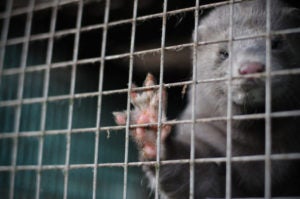
ROME—The Italian government has announced last night it will extend suspension of mink fur farming until 31 December 2021. The decision comes in the wake of the SARS-CoV-2 virus having been found on two mink farms so far in Italy. Italy has six fur farms with approximately 60,000 mink, 26,000 of whom were culled following the previous ordinance published in November last year by Italian Health Minister Roberto Speranza. Eleven countries in total (including nine EU member states) have now officially identified COVID-19 positive animals on mink farms: Denmark (290 farms), Netherlands (69 farms), Greece (23 farms), United States (16 farms), Sweden (13 farms), Spain (3 farms), Lithuania (2 farms), Canada (2 farms), Italy (2 farms), France (1 farm), Poland (1 farm).
Humane Society International, which campaigns globally for an end to the fur trade, welcomes the news but urges the Italian government to end the cruelty and public health risks by permanently ending fur farming. In December last year, HSI published a white paper highlighting the link between fur farming, poor animal welfare and infectious zoonotic disease.
Humane Society International’s director for Italy Martina Pluda, said: “While we applaud the Italian government for extending its temporary suspension of mink fur farming, to truly address the unacceptable risk of COVID-19 that fur farming represents, we urge it to permanently shut down this cruel and dangerous industry. Confining thousands of animals in small wire cages for fur production not only causes terrible suffering, but for as long as this exploitation is tolerated, and these wild species are crowded together in close proximity in low-welfare conditions, the potential for reservoirs of animal to human pathogens will persist.
Extending the temporary suspension is an important step, but if the government allows mink farming to start up again in 2022 in Italy, it will be placing the commercial interests of frivolous fur fashion ahead of the health of the public, and turning a blind eye to the suffering of thousands of animals.”
Earlier this month the European Food Safety Agency reported that all mink farms should be considered at risk for COVID-19 outbreaks. In January 2021, a Risk Assessment published jointly by the World Health Organization, the Food and Agriculture Organization of the United Nations, and World Organisation for Animal Health recognised Europe as a high-risk region in relation to the introduction and spread of SARS-CoV-2 within fur farms, in addition to the spill-over from fur farms to humans, and the transmission of SARS-CoV-2 from fur farms to susceptible wildlife populations. More specifically, it rated the risk factors and likelihood of introduction and spread of SARS-CoV-2 within fur farms in Italy as “likely”.
Fur Facts:
- On 27th October last year, it became publicly known that in August 2020 SARS-CoV-2 had been detected on a mink farm in Lombardy. This information only came to light after the submission of an information request by campaign organization LAV to the competent authorities. The OIE was only notified on 30th October.
- On 2nd February 2021 a further five positive tests were confirmed on a mink farm in the Veneto region. Furthermore, serology tests were performed on a sample of 60 mink, 90% of which showed antibodies, confirming that almost all animals on the farm had come into contact with the virus.
- An estimated 53 million mink are farmed for their fur in more than 20 countries around the world. The top three mink farming countries in Europe in 2018 were Denmark (17.6 million mink), Poland (5 million mink) and the Netherlands (4.5million mink). In August 2020 the Dutch government agreed to fast-track the permanent closure of its fur farms from a previous deadline of 2024 to January 2021 to prevent long term COVID-19 virus reservoirs forming on affected farms. Denmark killed all its mink in 2020 and has ended the keeping, import and export of mink until 31 December 2021; Sweden has suspended mink breeding and the movement of live mink until 31 December 2021; and mink fur farming has reportedly been halted in Belgium.
- China farmed 11.6 million mink for fur in 2019, a sharp decrease from 20.6 million mink in 2018.
- Fur farming has been banned in the UK since 2003. Over the past two decades, 21 countries have either voted to ban fur farming, prohibited the farming of particular species, or have introduced stricter regulations that have effectively curtailed the practice. These include numerous European nations such as Austria, Belgium, Bosnia-Herzegovina, the Czech Republic, Croatia, Macedonia, the Netherlands, Norway, Luxembourg, Serbia, Slovakia and Slovenia. Most recently the government in Hungary declared a ban on the farming of animals including mink and foxes, France committed to a phase out mink farms by 2025, and the Irish government made a commitment to bring forward legislation in 2021.
- Bulgaria, Estonia, Lithuania, Montenegro, Poland and Ukraine are also presently considering bans on fur farming and in Finland the majority party of the coalition government recently announced its support for a ban on fur farms.
ENDS
Media contacts:
- UK: Wendy Higgins, HSI director of international media: whiggins@hsi.org
- Italy: Martina Pluda, director of HSI in Italy: mpluda@hsi.org
The Humane Corporate Progress Award honors the Italian food group for its global cage-free policy
Humane Society International / Europe (in Italy)

PARMA–Italian food group Barilla, the world’s largest pasta manufacturer, is the recipient of this year’s Henry Spira Humane Corporate Progress Award, a recognition given by the Humane Society of the United States to companies that adopt policies which have a significant positive impact on animals. Humane Society International, which is the international arm of the Humane Society of the United States, joins in celebrating Barilla’s transition to responsible sourcing of cage-free eggs in its global supply chain. Barilla is one of only a handful of companies in the world to achieve a 100% cage-free egg supply chain ahead of schedule.
HSI’s first contact with Barilla was in late 2016, and in just a matter of months the Italian company committed to this animal welfare goal and achieved it in 2019, one year before the publicly announced 2020 deadline. Barilla provides yearly progress updates and egg sourcing statistics in its annual sustainability report. Barilla’s global policy applies to each of the six countries where the group operates. Barilla’s operations require 23.000 tons of eggs per year. The implementation of this animal welfare policy is changing the lives of an estimated two million laying hens worldwide each year.
Elena Franchi, purchasing manager at Barilla’s headquarters, stated: “We seek to do the right thing in our business model, and that’s what we’ve done here. We benefited from the steady and constructive support of Humane Society International, and our partnership was crucial to Barilla’s early completion of our stated goal. Particularly in Brazil, where we have been present for only a few years, the support of HSI has been critical for the success.”
Barilla joins a growing list of global companies transitioning to cage-free eggs. Cage-free production systems typically offer hens higher levels of welfare, allowing the birds to express more of their natural behaviors, including moving around, laying eggs in nests, perching, and fully spreading their wings. Although conventional cages have been prohibited in the European Union from January 2012, enriched cages are still legal and in Italy, 62% of hens are still raised in cages. Barilla’s policy recognizes the need to exclude cages altogether, ensuring higher welfare for egg-laying chickens.
Martina Pluda, director for HIS in Italy, says Barilla’s example has wider implications. “The company’s leadership is setting an important precedent for other companies, many of whom have made public commitments to go cage-free but have yet to make significant progress. I am very pleased that an Italian company is able to set such an important global standard within the food industry. Ensuring a better treatment of the animals involved is a shared responsibility of consumers and producers alike, and I would like to encourage more companies to follow this example. We look forward to working with Barilla’s leadership to promote the corporate progress vision at the heart of the Spira Award.”
The Henry Spira Awards recognize significant corporate animal welfare commitments in the memory of Henry Spira (1927-1998), a legendary Belgian-American humane advocate who specialized in constructive engagement with corporations committed to an animal welfare mandate as part of their corporate social responsibility missions. He is considered one of the most effective animal advocates of the 20th century.
ENDS
Media contacts:
- Martina Pluda, HSI in Italy, Country Director: mpluda@hsi.org; +39 371 4120885
- Andrea Belli, Barilla, Group Communication and External Relations: andrea.belli@barilla.com; +39 0521 262217
Humane Society International / Italy
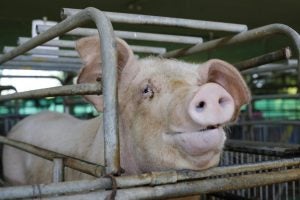
ROME—The Italian coalition, End the Cage Age, published today a ranking of European countries, which shows the percentage of farm animals still kept in cages. Of the over 300 million animals who each year are caged in the EU, over 45 million are in Italy. The coalition is calling on citizens to engage with the relevant Ministers of Health and Agricultural Policies, asking them to work on the transition to cage-free systems both in Italy and in the rest of the European Union.
Download pictures and report
Ranking
Download maps
In the European Union, most hens, sows, rabbits, quails, ducks and geese are raised in cages that critically limit their ability to move, forcing them to live a miserable life full of suffering, far from meeting minimum animal welfare objectives. Sensitivity for this issue is increasingly reflected amongst European citizens. Last year, following the campaign efforts associated with the End the Cage Age European Citizens’ Initiative, more than 1 million people signed a petition to end the use of cages in the EU. In Italy, over 90,000 signatures were collected and authenticated by the Ministry of the Interior.
Today the Italian End the Cage Age coalition, composed of Animal Equality, Animalisti Italiani, CIWF, ENPA, Humane Society International, LAV, Legambiente, Lega Nazionale del Cane, and OIPA, published a ranking of countries based on the percentage of animals raised in cages. In Italy almost all sows, rabbits and quails, as well as 62% of all laying hens are still kept in cages and it’s necessary to act as soon as possible to change this situation. Minister of Agriculture Teresa Bellanova and Minister of Health Roberto Speranza are responsible for implementing a transition to cage-free systems.
The End the Cage coalition asks citizens, starting today and in the coming days, to send tweets – using constructive language – addressed to the two ministers, asking them to commit publicly and concretely to phase out cages in our country. While Minister Speranza has already declared his willingness to start the dialogue on the transition to cageless systems for sows, so far there has been no reaction from Minister Bellanova.
The coalition declared: “Phasing out cages on farms is urgent because it responds to the pressing ethical request of millions of European citizens, and it is consistent with the growing attention in Europe for animal welfare and sustainability, as outlined in the Green Deal.
“Stopping the suffering of millions of animals is the ethical duty of every civil and democratic country. We hope that our Ministers will initiate public debate for a transition towards alternative systems as soon as possible, to ensure that our country does not fall behind in defending animals, and becomes a leader in the EU.”
The European Citizens’ Initiative is an official and unique tool provided by the European Union to influence political decision-makers. It involves the collection of at least 1 million signatures. Each signature is verified through a specific process by the Member States.
The End the Cage Age European Citizens’ Initiative has collected over 1.5 million signatures that are still being validated in all Member States. In Italy validation has already been completed, confirming the validity of over 90,000 signatures. When this process is completed in all Member States, the signatures will be delivered to the Commission, which will be able to pronounce positively or negatively on the request, possibly starting a legislative process to phase out cages.
The End the Cage Age Initiative was the result of the coordination of over 170 animal, environmental and consumer protection organizations across Europe, including 20 in Italy.
END
